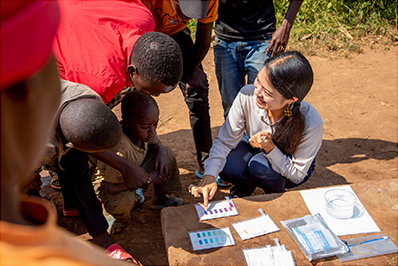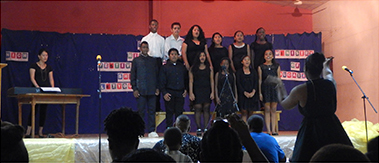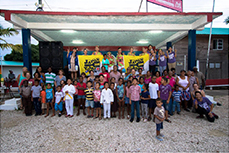(2) Japan Overseas Cooperation Volunteers (JICA Volunteer Program)

A community development volunteer belonging to W-SAT in Rwanda explaining the composition of water to local residents using a water quality testing kit (Photo: JICA)
The Japan Overseas Cooperation Volunteers (JICA Volunteer Program) started in 1965 and has a long record of success over half a century. More than 54,400 volunteers have been dispatched to 98 developing countries and regions in total. This is truly a program for public participation and has contributed to the development of these countries and regions, embodying the “visibility of Japanese development cooperation.”
The JICA Volunteer Program is highly regarded both domestically and internationally. The program not only contributes to the economic and social development of developing countries and regions, but also promotes mutual understanding and friendship between Japan and these countries and regions through the deepening of local people’s affinity for Japan. Moreover, the program draws attention in the respect that ex-volunteers utilize their experiences and knowledge to give back to Japanese society. For example, ex-volunteers who have obtained global perspectives through the program contribute to the local revitalization in Japan and the business expansion of Japanese private companies to developing countries.
In order to promote these initiatives, the Government of Japan strives to make it easier for more people to join the program through supporting ex-volunteers in developing their careers, as well as disseminating information on how to participate in the program while retaining one’s job (see “Project Introduction Column” for the activities of a JOCV who participated in the program while retaining their job).
As for the response to COVID-19, after all volunteers returned to Japan at once in March 2020, the dispatch of JOCVs resumed in November of the same year, and volunteers had been dispatched to 61 countries by December 2022. The resurgence of COVID-19 cases caused difficulties for the planned dispatch of new JOCVs and the autumn recruitment for FY2021 was suspended. However, both spring and autumn recruitment for FY2022 have taken place, and JOCVs have been dispatched sequentially depending on the infection situation in the receiving countries. For example, in Rwanda, where JOCV activities have resumed, JOCVs are involved in the activities of the “Water Security Action Team (W-SAT),” which engages in initiatives to secure safe water, develop systems for maintenance and management of water supply facilities, and implement a wide range of activities related to water use. Volunteers also participate in activities related to coffee, which include providing technical instruction on coffee growing, enhancing marketing capabilities, and training the next generation of coffee growers.
Belize
Working to Build a Bridge of Happiness!
Japan Overseas Cooperation Volunteers (Participation with Incumbent Occupation) Category: Music
(June 2015 – March 2017) Ms. MORI Mio (Kyoto Prefectural Board of Education)
The Toledo District, located in southern Belize, lacked teachers with specialized music education. I was assigned to Toledo Community College where I conducted music classes and provided technical guidance to fellow teachers. During my assignment, a colleague of mine who understood the importance of emotional education suggested, “Let’s form a chorus club and participate in competitions! I want to build confidence in our students!” Approximately 15 students who expressed an interest in joining the club competed in a regional qualifier, and the club made it to the national competition. In addition, I organized workshops at five schools and events in three regions in order to spread Japanese culture, and more than 1,500 people in total enjoyed activities such as traditional Yosakoi dance and wearing casual-style kimono called yukata. Through the activities I engaged in as a Japan Overseas Cooperation Volunteer (JOCV), I learned that “the happiness of children and the community is something that transcends the boundaries of various positions and is created through everyone’s cooperation.”
Currently, I am back working as a music teacher at a high school in Kameoka City, Japan. In addition to music classes, I work to connect high school students with Kameoka City Hall, universities, and private companies, and actively engage in planning and managing collaborative classes Note 1 on the SDGs.
While the world and society are changing rapidly, the environment surrounding Japanese students and the problems they face are also diverse. Under such circumstances, I believe that we can create new forms of happiness by collaborating not only with schools and teachers but also with people in various positions. I would like to work as a person who can create various connections by removing the “wall” between the school and the community, making use of my experiences from JOCV activities.

The established chorus club competing in a regional qualifier (Photo: MORI Mio)

Japanese cultural event held in Punta Gorda, the place of assignment (Photo: MORI Mio)
Note 1: Business entities, NPOs, and other organizations that are working to solve social issues conduct classes together with schools, utilizing their specialized knowledge and skills, in order to realize practical and real learning that cannot be offered by schools alone.
